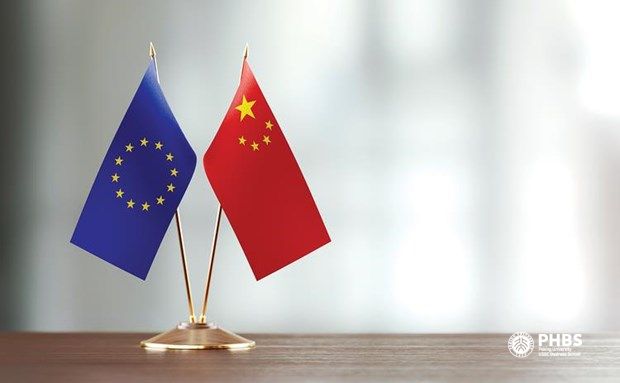In the 21st EU-China Summit, European Union and China leaders agreed that they would intend to enter into what they called an “ambitious” comprehensive investment agreement by 2020. It takes 5 years for China and the Europe to set a target date to agree such a long-planned investment treaty. Early this year, Brussels once branded Beijing a “systemic rival” as well as an “economic competitor”, marking a toughening of the EU’s tone.
Why has the EU's attitude towards China changed dramatically in such a short time? What are the breakthroughs in the agreement? In a recent interview, Professor Gerhard Stahl shared his insights on the outcomes of the summit, the importance of bilateral ties and future of China-EU relations. Once as a member of the Cabinet of the European Commissioner for Regional Policy, Professor Stahl has much expertise in topics related to the European internal market and EU policies, and has published many papers concerning China-Eu relations.
Professor Stahl accepts interview at PHBS Future Media Lab
Q: This year the regular EU-China summit took place in Bruxelles on 9th April 2019. You have followed these summits for years. Now you do it as researcher; in the past you could contribute to the policy making as secretary general of a EU-institution, the EU committee of the regions. What are the main outcomes of this year’s summit?
Stahl: This year’s 21
st summit was of special importance. In an international climate where the American government questions the benefits of free trade and the globalized economy, where more and more experts advocate for protectionist measures, where populist movements want to create new barriers between people and countries, the cooperation between the EU and China is more important than ever to keep the world economy open.
I was very pleased that -after intensive preparations and tough negotiations- the Chinese delegation headed by Premier Li Keqiang, and the European delegation under the leadership of EU-Commission President Juncker could agree on an ambitious program for the future, covering a broad area of economic and political measures. Both sides confirmed their firm support to the rules-based, transparent, non-discriminatory, open and inclusive multilateral trading system with the World Trade Organization (WTO) at its core. They confirmed the cooperation on the WTO reform based on the work of a joint working group.
In light of the trade disputes it was of specific importance that both agreed to achieve in the course of 2019 the decisive progress required for the conclusion of an ambitious EU-China Comprehensive Investment Agreement in 2020.
Q: Why is EU-China cooperation so important and what is the objective of the EU-China comprehensive Investment Agreement?
Stahl: China and the EU have been the mayor driving forces and pillars of the globalization process and of free trade. In the last fourth decades a globalized economy emerged, allowing more and more developing countries to take part in trade and to develop their economies. Companies became international, supply chains crossing international borders were developed, trade in goods and services increased and more and more people could be lifted out of poverty. China’s successful opening up policy was a decisive factor for the positive development of the international economy in the last decades. China alone is contributing to one third of the growth of the global economy. The other mayor factor was the European Integration with the establishment of a big internal market for more than 500 million citizens.
The EU abolished national barriers against trade and economic exchanges and became one of the most open and internationally oriented markets. The EU is now China’s number one trading partner, before the US. China became the second biggest trading partner for the EU, after the US. Each day goods and services of more than 1000 million dollars are exchanged between both sides. Also the development of direct investments strengthened the cooperation. Whereas at the beginning of Chinese opening up policy it were mainly European companies that invested in China, in last years China became a major investor in Europe. Around 40% of Chinese FDI is currently going to Europe.
But the closer economic links and the up grading of the Chinese economy from the workbench for simple export products to an innovation driven economy create also new challenges. Whereas Chinese companies can take over European companies, as it was the case in 2010 with the Volvo car company by the Geely Holding Group or the robotics producer Kuka by the Midea Group, European companies complain about barriers for their investments and unequal treatment. Also access to state subsidies and financial support for research and innovation becomes a sensitive issue.
The successful conclusion of the comprehensive EU-China investment agreement would be a strong signal, that common rules can be established between the socialist market economy of China and the social market economy of the EU. This agreement would demonstrate that a common understanding about access to markets, investment rules, competition policy and state aid can be developed between different political and economic systems.
The mayor economic pillars of the world economy that means China, EU and US should develop a common understanding of basic rules and principles of economic cooperation to assure the future of an open and globalized economy. When an American Administration follows a unilateral policy focusing on “ my nation first ", the EU and China should deal to demonstrate that there is a multilateral alternative to the renationalization of economic relations.
Q: How do you see the future of EU-China relations and what are the important areas of cooperation?
Stahl: The EU and China have since 1975 diplomatic relations and agreed in 2003 to a comprehensive strategic partnership. Since than regular expert meetings and annual EU-China summits take place to implement this agreement. The partnership includes an annual dialog on numerous areas like foreign and security policy, economy, trade, financial markets, competition policy, research and innovation. This cooperation created already some positive results, as can be seen in the common support of the Iran Nuclear Deal against American opposition.
Compared to US-China relations the EU-China cooperation has one advantage. The EU sees China as an important partner and also as an economic competitor but not as a geopolitical rival.
The EU-China partnership should be intensified to prepare answers to important common challenges. I would like to give some ideas concerning two priorities:
- Measures against climate change
A sustainable economic model has to be developed, in the words of Chinese leadership: an ecological civilization has to be built. Without fundamental changes in the economy, global warming will have dramatic effects on the ecosystems, biodiversity and human livelihoods. The fight against climate change cannot succeed by national measures alone, a coordinated international policy is needed. The EU was a frontrunner in climate policy and environmental legislation. It established e.g. the first big international CO2 emission-trading scheme to reduce Greenhouse gases. China is also committed to an ambitious environmental policy. This could be seen by China’s signing of the Paris Climate agreement of December 2015. Also the last G20 meeting on the 28
th and 29
th of June 2016 confirmed China’s engagement by supporting together with the European countries the commitment to an ecological paradigm shift. The US which have withdrawn their support to the Paris agreement also objected to this commitment in the G20 Osaka declaration.
Cooperation to fight climate change should address very concrete measures. Best practices can be exchanged between European and Chinese experts about sustainable city planning, public transport, circular economy and waste disposal, energy saving and green energy. I can tell you based on my experience that there are already very interesting exchanges between Chinese and European cities and regions on these issues.
- Develop an open and fair international economy
A common position is needed against trade- and investment-barriers and rising protectionism. Furthermore EU and China should cooperate on the reform of the WTO and the international monetary and financial system including review of quotas of the International Monetary Fund. This reform should help developing and emerging countries to get their fair share in the global governance and international economy.
The system of international financial institutions that emerged after the Second World War, with the International Monetary Fund the World Bank and the dollar as the dominant international reserve currency has not sufficiently adapted to a changing world. Therefore new international financial institutions such as the Asian Infrastructure and Investment Bank and the BRICS Bank were created. It is a promising sign of EU-China cooperation that mayor European countries supported the creation of the AIIB and have been amongst the founding members.
With globalization the heavyweight of the world economy shifts to Asia, where more than half of the world's population lives. In 1990 the US and the EU accounted for more than 60% of global economic output, its share has now fallen to 40%. Looking to the demographic developments of the world population further changes will happen. Especially Africa’s economic importance should increase, based on a growing and young population and plenty of natural resources.
EU-China cooperation could support and facilitate economic development in Africa and its integration into the international economy. Chinese companies are mayor investors in more than 20 African countries; Africa-China trade increases quickly and has become very important. The One Road One Belt initiative provides support and financing to build the necessary infrastructure for the further economic development.
But there are also close and longstanding economic relations between African and European Countries. The EU is the biggest trading partner of Africa before China. The EU and its countries is by far the biggest donor for development assistance in Africa. Cooperation between the EU and China could create synergies, improve the efficiency of financial assistance programs and could extent beyond economic questions e.g. supporting measures to improve security in conflict regions.
We are in an historical moment where conflicting concepts are presented concerning the future of international relations and the international economy. Successful EU-China cooperation could be essential to safeguard a globalized economy and to reject a return to national power politics that was so devastating in the 20
th century.
















